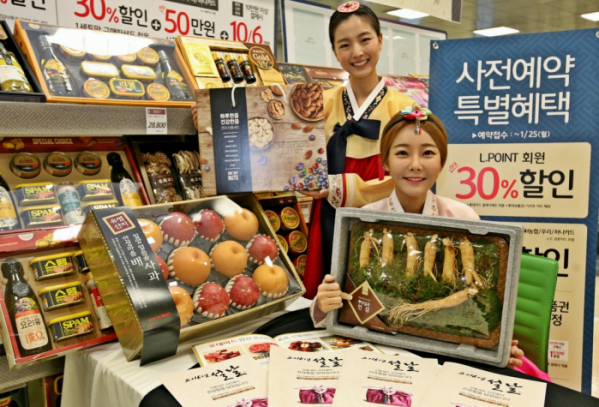
▲ A hypermarket store that pre-orders New Year gifts. (Photo provided by Lotte Mart)
With the overall rise in prices this year, the price of supplies for the New Year’s Day is also rising from last year, and it is estimated that the cost of setting up the New Year’s Day this year will be 11% more than that of last year.
As of the 21st, the Korea Inflation Association conducted a survey on the prices of 29 items such as fruits, nuts, and vegetables in 8 traditional markets in 6 major cities across the country, including Seoul, Incheon, Busan, Daegu, Gwangju, and Daejeon. On the 22nd, it was announced on the 22nd that the cost for the standard New Year’s turn was 23,3750 won, up 11.0% from last year’s Lunar New Year (23,160 won).
Among the surveyed items, 21 items with an increase in price and 7 items with a decline were found.
It was investigated that the price of vegetables rose mainly because the supply of fruits ran out of demand due to the damage of fruits and burns caused by the rainy season and typhoon last year, and the prices of vegetables rose as shipments declined due to sluggish crop conditions due to the recent cold wave.
Among the fruits, apples rose 22.3% from last year and pears rose 12.5%, respectively, based on five prizes.
Nuts, chestnuts and dates have risen. The cost of purchasing 1kg of chestnuts averaged 8070 won, up 2.4% from the New Year’s Day (7880 won) last year, and the price of jujube (400g) rose 12.1%. The price of dried persimmons (10 products) fell by 6.5%.
The price of Korean leek (1st stage) has risen 100% from last year, and spinach and bellflower are also trading at a price of 32.0% and 8.6%, respectively. Radish prices fell 35.7%.
As for meat, beef (400g of soup stock) increased 25.7% from the New Year’s Day last year, and pork (1 kg of pork for meat) increased 17.6%.
The Price Association said, “The demand for home food is increasing due to the Corona 19 crisis, but the supply of sequential supplies is not smooth due to sluggish crop conditions, bad weather, and livestock epidemics,” and said, “The burden of turnover costs is expected to increase slightly.”
